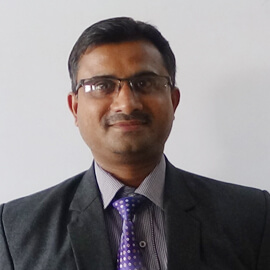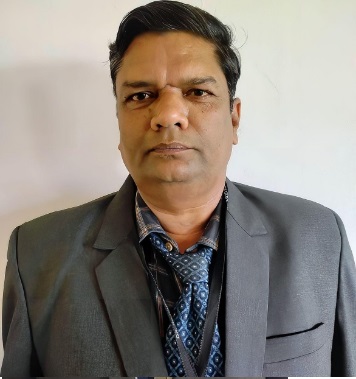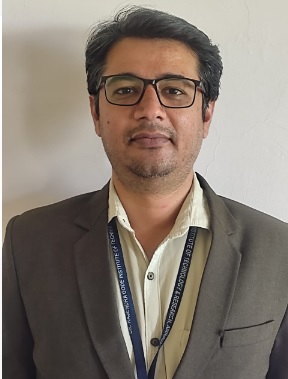The Department of Electronics and Telecommunication Engineering was established in 2008 offers graduate program B.E. (Electronics and Telecommunication Engineering), post graduate course M.E. (Electronics and Telecommunication Engineering).The department has research program leading to Ph.D. degree in Electronics and Telecommunication Engineering with a vision of imparting the cutting edge technologies of the world in Education. Electronics and Telecommunication Engineering Department has state-of-the-art laboratories such as
All the laboratories are well-equipped with major equipments like Microwave Bench, Digital Storage Oscilloscopes and softwares like Microwind, pSpice, MATLAB, etc. The students are given more practical exposures and innovative methodologies for the design and development in the electronics field, which is the backbone for all Engineering disciplines. The department is always at the forefront of technology and to keep the knowledge updated, organized several activities like guest lectures, Seminars and workshops.
Electronics & telecommunication engineering plays a vital role in almost every field in the age of Information and technology. Electronics is the study, application and control of the scientific phenomenon concerned with flow of electrical current. Telecommunication sector involves the telephone industry, computer industry, microwave radio systems, satellite communications, earth stations using satellite dishes, cellular phones industry. Electronics and Telecommunication Engineering is a field that involves complex electronic apparatus, circuits and equipments that helps in executing speedy and efficient telecommunication systems.These engineers design, fabricate, maintain, supervise and manufacture electronic equipments used in entertainment industry, computer industry, communication and defense. Ever increasing pace of development in electronics, audio and video communications systems and the automation in industry have made an electronic engineer a channel for the change of the modern society.
|
PEO.1 |
Graduates will be successful in modern day Engineering career or undertake entrepreneurial endeavors, participate in regional and large-scale workforce, and contribute to the economy. |
|
PEO.2 |
To inculcate professional ethics, managerial and communication skills to develop ingenious solutions for the benefit of society and environment. |
|
PEO.3 |
Graduates will become responsible citizens demonstrating high ethical and professional standards to serve the society better |
|
PEO.4 |
To provide strong foundation in Electronics and Communication Engineering to pursue professional career, entrepreneurship and higher studies. |
|
PO1 |
Engineering knowledge: Apply the knowledge of mathematics, science, engineering fundamentals, and an engineering specialization to the solution of complex engineering problems. |
|
PO2 |
Problem analysis: Identify, formulate, review research literature, and analyze complex engineering problems reaching substantiated conclusions using first principles of mathematics, natural sciences, and engineering sciences. |
|
PO3 |
Design/development of solutions: Design solutions for complex engineering problems and design system components or processes that meet the specified needs with appropriate consideration for the public health and safety, and the cultural, societal, and environmental considerations. |
|
PO4 |
Conduct investigations of complex problems: Use research-based knowledge and research methods including design of experiments, analysis and interpretation of data, and synthesis of the information to provide valid conclusions. |
|
PO5 |
Modern tool usage: Create, select, and apply appropriate techniques, resources, and modern engineering and IT tools including prediction and modeling to complex engineering activities with an understanding of the limitations. |
|
PO6 |
The engineer and society: Apply reasoning informed by the contextual knowledge to assess societal, health, safety, legal and cultural issues and the consequent responsibilities relevant to the professional engineering practice. |
|
PO7 |
Environment and sustainability: Understand the impact of the professional engineering solutions in societal and environmental contexts, and demonstrate the knowledge of, and need for sustainable development. |
|
PO8 |
Ethics: Apply ethical principles and commit to professional ethics and responsibilities and norms of the engineering practice. |
|
PO9 |
Individual and team work: Function effectively as an individual, and as a member or leader in diverse teams, and in multidisciplinary settings. |
|
PO10 |
Communication: Communicate effectively on complex engineering activities with the engineering community and with society at large, such as, being able to comprehend and write effective reports and design documentation, make effective presentations, and give and receive clear instructions. |
|
PO11 |
Project management and finance: Demonstrate knowledge and understanding of the engineering and management principles and apply these to one’s own work, as a member and leader in a team, to manage projects and in multidisciplinary environments. |
|
PO12 |
Life-long learning: Recognize the need for, and have the preparation and ability to engage in independent and life-long learning in the broadest context of technological change. |

| Name | Dr. A. O. Vyas |
|---|---|
| Designation | Associate Professor & HOD |
| Qualification | Ph.D, M.Tech(ESC), B.E. |
| Teaching Experience | 15 Years |
| nyasaarchana@gmail.com | |
| No. of Publication | 33 |

| Name | Ms. K. M. Pimple |
|---|---|
| Designation | Assistant Professor |
| Qualification | M.E.(Digital Electronics),B.E |
| Teaching Experience | 15 Years |
| kmpimple@drgitr.com | |
| No. of Publication | 12 |

| Name | Mr. P. P. Likhitkar |
|---|---|
| Designation | Assistant Professor |
| Qualification | M.E.(Digital Electronics),B.E |
| Teaching Experience | 13 Years |
| 9975046219p@gmail.com | |
| No. of Publication | 13 |

| Name | Mr. R. R. Solanke |
|---|---|
| Designation | Assistant Professor |
| Qualification | M.E (Electronics & Telecomm.),B.E |
| Teaching Experience | 15 Years |
| rrsolanke1972@gmail.com | |
| No. of Publication | 10 |

| Name | Mr. R. S. Shriwas |
|---|---|
| Designation | Assistant Professor |
| Qualification | M.E(Digital Communication), B.E. |
| Teaching Experience | 13 Years |
| ravi.shriwas@gmail.com | |
| No. of Publication | 17 |

| Name | Mr. R. R. Sharma |
|---|---|
| Designation | Assistant Professor |
| Qualification | M.Tech(EXTC), B.E. |
| Teaching Experience | 09 Years |
| sharma.rahul1486@gmail.com | |
| No. of Publication | 02 |

| Name | Ms. A. S. Chaudhari |
|---|---|
| Designation | Assistant Professor |
| Qualification | M.Tech(Signal Processing), B.E. |
| Teaching Experience | 1 Years |
| Amrutachaudhari58@gmail.com | |
| No. of Publication | 01 |

| Name | Ms. M. M. Harne |
|---|---|
| Designation | Assistant Professor |
| Qualification | M.E. (Digital Electronics) |
| Teaching Experience | 2 Years |
| NIL | |
| No. of Publication | NIL |

| Name | Ms. Roshana M. Pusdekar |
|---|---|
| Designation | Assistant Professor |
| Qualification | M.Tech(VLSI), B.Tech |
| Teaching Experience | 6 Years |
| roshana28@gmail.com | |
| No. of Publication | 01 |

| Name | Mr. Dikshant B. Patil |
|---|---|
| Designation | Assistant Professor |
| Qualification | M.E. (Electronics and Telecommunication) |
| Teaching Experience | NIL |
| dikshantpatil17@gmail.com | |
| No. of Publication | 02 |

| Name | Ms. Vaishnavi Asole |
|---|---|
| Designation | Assistant Professor |
| Qualification | M.E. (Electronics and Telecommunication) |
| Teaching Experience | 1 year |
| vaishnaviasole@gmail.com | |
| No. of Publication | 02 |